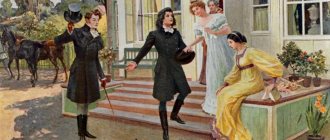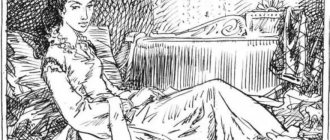- Essays
- On literature
- Other
- Old Man Santiago in the novel The Old Man and the Sea
The famous story called “The Old Man and the Sea,” written by Hemingway, shows in detail the life of one extraordinary fisherman named Santiago. This man is quite wise, he has a well-spoken speech, and is fully developed in the fishing industry. He is too “thin and gaunt” for his age. However, the hero has happiness, which gives him strength and helps him move forward. The character's joy is being at sea.
It is important to note that Santiago can understand the language of nature. The hero acquired such a skill over many days spent in the ocean. He feels like he is part of nature's blessings. “And the old man always thought of the sea as of a woman,” for him the expanses of water were considered a living creature that could soothe and delight the soul. Santiago has a truly unique ability. This is a long unity with the beauties of the world, endless wonder at the riches of nature. He is so familiar with the open spaces that with their help he becomes enriched spiritually. The sea heals the old man, makes him open his eyes every day and smile at this extraordinary world.
It is noteworthy that the name Santiago translates as “holy man”, this is indeed believed to be true. The hero is a kind person by nature, he is a sympathetic, compassionate character. Even the fact that he takes the lives of the unfortunate inhabitants of the sea confuses him. The character often reproaches himself for catching fish, because she also has children. Santiago is aware of this fact, which is why this image of the old man in Hemingway’s work amazes the imagination. The hero is so open to the world that he simply falls deep into his soul. His care for natural resources deserves respect! But the pride is that a man passes on his skills to a new generation. An ordinary boy who, with naivety and love, absorbs everything said from the fisherman’s lips. Santiago is truly a real man! He is a noble and wonderful hero. It is important to follow this image as an example, otherwise in a few years the world will be in a deplorable state.
Despite the character’s plight, his soul is pure and wonderful! He is sweet and kind-hearted. He is quite old. The hero understands that in his old age he is left alone. But Santiago always knew that at sea a person is “never alone,” for this is nature! That's life!
Image of old man Santiago
In Hemingway's wonderful story "The Old Man and the Sea" there is a hero, Santiago. The author wrote that this hero is the prototype of a fisherman from Casablanca. This image is a collective one, namely a collective one, because there are enough fishermen in Cuba.
This hero is an indicator of kindness and masculine strength. The image is full of romance and folklore motifs. This person is quite open and simple-minded. His traits help him navigate the complexities of life. A significant role is played by his determination and extraordinary endurance and fortitude. Santiago behaves correctly towards nature. Yes, he takes something from her, but he considers himself one of the elements of nature, part of the cycle. Santiago not only catches his prey, he seems to go through a certain ritual, a sacred ritual. Fishing is perceived not as murder, but as a proper process in a unified system of nature.
The fisherman sometimes talks about life, but quite simply and artlessly. In principle, this corresponds to his image, because the old man is happy with what he has. He is poor, has meager housing and the most ordinary food. Santiago is not at all bothered by the problems, the physical pain that the rope gives him, cutting his hands. Even when the old man is not hungry, he still eats fish, raw fish. Santiago does his best, using all his skills and tools to fight the sharks.
Every time he encounters marine life, Santiago shows respect for it. And not only for fish, he shows love for all living things. For example, he is a little worried about the birds, who may not find food for themselves. When Santiago encounters a big fish on his way, he shows special respect for it. The old man sees a worthy opponent in the huge fish and even accepts the possibility of his defeat. When Santiago suffers defeat, he takes it calmly. There has never been a fisherman complaining, he just switches off from everything and does his job. One day, a shark deprived a fisherman of his catch, but he took his defeat calmly. As the author writes, even some lightness appeared in his soul.
An old boat and a sail that is practically useless. Old age and fatigue of Santiago. But this does not force the old man to give up, he fights to the last. His drive and strength ultimately helped him win the decisive battle. The main thing that the author wanted to convey to us is that it is impossible to defeat a person. Man can only be destroyed.
“The Old Man and the Sea” characteristic of Santiago
“The Old Man and the Sea”, the image of the main character Santiago and his characteristics are given in this article.
“The Old Man and the Sea” characteristic of Santiago
At the center of Hemingway's story is the figure of an old, lonely fisherman Santiago with "the cheerful eyes of a man who does not give up." He has long lived only with memories of his youth and dreams of the shores of Africa he once saw... Santiago befriends the neighbor boy Manolino, feeling in him the same romantic soul and passion for the sea.
Character traits and portrait of Santiago
- honest worker
- physically strong
- hardy
- ascetic
- strong-willed
- experienced fisherman
- philosopher
- optimist
- humanist
- romantic
- loves and understands nature
- loves the boy like a son
Santiago image
The old man lives according to his own work code of ethics, heroically fighting for life and human dignity. For almost three months every day he goes to sea and returns without a catch. On the eighty-fifth day, Santiago catches a huge marlin. By the way, it is very difficult to catch a fish such as marlin, since it reaches speeds of up to 140 km/h and its weight reaches 1200 pounds (about 600 kg). She can easily lead a boat and even sink it.
The fish are eaten by sharks. The old one seems to be failing. Sadness, loneliness, old age. Weakness and decline are emphasized even in the description of the appearance of fishing.
But let us remember how Santiago fought with the fish. At the decisive moment, when after a three-day race the marlin was tired and emerged from the sea, the old man felt his head “dizzy.” However, he stopped himself: “You need to have a clear head. So, gather your thoughts together and learn to endure like a man. Or like this fish." The fisherman tried to mobilize all his strength as much as possible in order to win and prove to those who considered him a loser, to himself, a sea creature, that he was still worth something! “It’s pointless to lose hope,” he thought. “It’s pointless and probably a sin.”
The old man's fight against the sharks expresses optimism. Hemingway tirelessly emphasizes the theme of human invincibility again and again. In essence, the story teaches that as long as a person is alive, as long as he feels like a human, there is hope for the best. The old man is left without a weapon, his fatigue exceeds the limits of what is possible. He knows that the sharks will attack again at night. What can he do? Fight until he dies. A little later he dreams that he won’t have to fight anymore, but again and again he fights. When defeat seems certain, when there is nothing left of the fish, victory looms in the defeat itself. The old man again, as at the beginning of the story, carries home - even without the boy's help - a mast with a furled sail. He falls asleep and dreams of the lions of his youth, and the boy protects his sleep, waiting for new, happy days of the transfer of wisdom from the old man to him, a representative of the younger generation.
“If you want,” says D. Zatonsky, “the image of old Santiago from Hemingway’s parable story “The Old Man and the Sea” is elevated to the level of a myth, a myth about a man, defeated and at the same time invincible.”
Option 3
One of Hemingway's most striking works is The Old Man and the Sea. In this work there is one of the main characters, he is Santiago. He was an old Kuban Cossack who lived in a village, and next to him there was a lake. Almost every day he came to this lake and stayed here for a very long time. Here he recalled his younger years and the positive moments he had in life. And from the sun he developed pigmented black spots that nothing can hide. In addition, he has large wrinkles and a bald head.
Almost every day he had to catch a huge amount of fish and from the net he got deep wounds on his hands, and they no longer healed. But despite this, he still has a powerful body and beautiful blue eyes. And these eyes looked very much like the sea.
The positive character traits of the main character are endurance to everything that fate throws at him, and from this he only became stronger. In addition, he had a great love for the sea.
A man lives in poverty, and he has no conditions for existence, and he doesn’t need anything. He only had one shirt, and even that was covered in patches. He covered his bed with various newspapers and magazines. He ate the same fish that he caught every day. He had lost the habit of talking to people and therefore made do with simple, terse phrases, which he repeated day after day.
It all started with the fact that he served as a cabin boy on a large ship. And now I could travel around the world and look at it with different eyes. And although many years have passed, every night he sees the same dream and there the same ship sailed to him, on which he later went on a journey. Of course, sometimes there are very disturbing and even terrible dreams, and then he wakes up in sweat and then cannot fall asleep for a very long time and constantly remembers everything that happened to him at sea.
Of course, like any man, he also had women whom he dated. But now he doesn’t even want to remember anything about them, and even if moments pop up in his head, he drives them away very quickly and doesn’t want to delay them.
Now a little boy lives with him, whom he teaches everything he knows. In addition, he goes to the sea with him every day and learns little by little. Also often the old man takes him on a short trip while he goes fishing. And they go out to sea on a small boat, which has become leaky from old age. One day, while traveling, they were attacked by sharks, but the old man managed to fight off the sharks and also get out of the battle with dignity.
Article The image of old man Santiago in E. Hemnguey’s story “The Old Man and the Sea”
The image of old man Santiago in E. Hemnguey’s story “The Old Man and the Sea”
SANTIAGO is the hero of E. Hemingway’s story “The Old Man and the Sea.” The real prototypes are considered to be Fernando Manuel Peredos (nicknamed Gallego), Anselmo Hernando, Gregorio Fuentes, captain of Hemingway's boat. Hemingway himself wrote that he reflected “the character traits of an old fisherman he knew from Casablanca.” We can say that Santiago is a collective image of a fisherman from the northern coast of the island of Cuba, in the Cojimar region. At the same time, this is a symbolic image in which romantic and folklore motifs are strong. Santiago absorbed the best qualities of the human soul - kindness, perseverance, courage. His simple, natural heroism is based on an amazing interweaving of humility and pride, which allows him to endure hardships and not admit defeat. He has rare endurance and determination.
Santiago embodies the type of person who does not strive only to take from nature; he is aware of his natural position in nature, in the harmony of its eternal circulation. Santiago’s connection with the giant fish he caught, which he “loves,” is indissoluble. The fight against it and the sharks that take away the prey is an endless dispute between man and nature. The old man does not fish, but, as it were, performs a sacred ritual, performing the prescribed ritual.
K. Baker viewed Hemingway's story as a biblical parable, correlating the image of Santiago with the personality of Jesus Christ. In his image, the motive of teaching is also important: the boy, Santiago’s assistant, is sure that the stprik is able to teach “everything in the world” and the main thing in life.
The story contains biblical reminiscences. The old man's name is Santiago - just like Saint James, and the Old Testament Jacob, who challenged God himself, and in the old man's reasoning about life, man, sins, and in his reading of the main Christian prayers - “Our Father” and “Virgin Mary”.
Santiago's thoughts about life are simple and artless. He himself looks like this: old, emaciated, content with little - simple food, a poor hut, a bed covered with newspapers.
Day after day, exhausting big fish in the ocean, the old man does not think about how painful or hard it is for him from the strings cutting his arms and back. He is trying to save his strength for the decisive battle. He catches tuna and flying fish in the sea and eats them raw, even though he does not feel hungry. He forces himself to sleep to gain strength. He uses all available means to fight the sharks that are encroaching on his fish. And he also talks, evaluates, remembers. Constantly. Including fish - both living and dead.
When a mutilated carcass remains of the sea beauty, the old man becomes uneasy. He doesn't know how to deal with fish. Having killed one of the most beautiful creatures of this world, Santiago justifies his act by saying that the fish will satisfy him and other people. Prey torn to pieces by sharks is deprived of this simple, everyday meaning. The old man apologizes to the fish for the fact that everything turned out so badly.
The main goal of the writer is to show how our world works, in which a fisherman is born a fisherman, and a fish is born a fish. They are not enemies to each other, they are friends, but the meaning of a fisherman’s life is to kill fish, and there is no other way.
Every time the old man encounters sea creatures, he shows himself to be a man who loves, pities and respects every creature of God. He worries about the birds, which have a hard time getting food for themselves, enjoys the love games of guinea pigs, and feels sympathy for the marlin, who lost his girlfriend due to his fault. The old man treats the big fish with deep respect. He recognizes her as a worthy opponent who can win the decisive battle.
The old man meets his failures with truly Christian humility. He does not complain, does not grumble, he silently does his work, and when a little talkativeness attacks him, he orders himself in time to return to reality and get down to business. Having lost his catch in an unequal battle with sharks, the old man feels defeated, but this feeling fills his soul with incredible lightness.
“Who defeated you, old man?” he asks himself and immediately gives the answer. - Nobody. I'm just too far out to sea.
This simple reasoning reveals the unbending will and real worldly wisdom of a person who has learned the vastness of the world around him and his place in it, a place, although small, but honorable.
Reconciled by difficult experience with the inevitability of everyday trials, considered “unlucky” in the village (going to sea for eighty-four days in a row, he invariably returned without a catch), Santiago, however, does not lose courage: he is sure that his main battle is still ahead.
Idea of the work
“Man can be destroyed, but he cannot be defeated.”
The sail of Santiago's boat is old and incapacitated, and the hero himself is an old man, exhausted by life, with cheerful eyes. Through the eyes of a man who doesn't give up. This is the philosophical symbolism of the story. When the reader watches the old man fight with the fish, in the actions and words of the main character he sees the fatalism of the eternal struggle of man. Santiago exerts all his strength and, despite everything, continues the fight, at the end of which he wins. It is at this moment that one of the main philosophical ideas of the work is revealed, which is that “a person can be destroyed, but he cannot be defeated.”
The exhausted and weakened hero nevertheless returns to the port, where the boy is waiting for him. Hemingway shows us the old man as a winner and reveals the strength of his character. The image of Santiago absorbed the features of a real hero, a man who never betrays himself and his principles.
The old man in the story evokes not compassion, but love. He is loved by a boy who went to sea with him several times to learn to fish, until his parents sent him to another, more successful boat. The reader loves him. Art rarely depicts old people in a way that makes them lovable. And more often it depicts, even warm, condescension. You can't condescend to Hemingway's old man.
This is how the boy’s love for him is described at the beginning of the story: “When the boy returned, the sun had already set, and the old man was sleeping, sitting on a chair. The boy took the old soldier's blanket from the bed and covered the back of the chair and the old man's shoulders with it. These were amazing shoulders - powerful, despite their age, and the neck was strong.
“Don’t take off the blanket,” said the boy. “As long as I’m alive, I won’t let you fish without eating.” -
“We need to get him some water, soap and a good towel,” the boy thought. How did I not think of this before? He needs a new shirt, a winter jacket, some shoes and another blanket."
And at the end of the story, when the old man returns with the skeleton of a huge fish that was eaten by sharks, and returns a few days later with his hands cut to the bone by fishing line, Hemingway will write about the boy’s love differently:
“How is he feeling? - one of the fishermen shouted to the boy.
“He’s sleeping,” the boy responded. He didn't care that they saw him cry. “There’s no need to disturb him.” -
And the old man’s love reveals itself as a constant refrain in his thoughts far out to sea: “It’s a pity that the boy is not with me”... “If only the boy were here!”
It is love for the boy that allows the old man to endure the unbearable and overcome the impossible, and not proud loyalty to human dignity, courage and human capabilities.
Hemingway endows him with a mysterious and incomprehensible quality - humility. “He was too simple-minded to think about when humility came to him. But he knew that humility came without bringing with it either shame or loss of human dignity.”
Once, in his youth, he had the nickname Santiago the Champion. It appeared after one day he competed with a powerful black man, the strongest man in the port.
“They sat for a whole day opposite each other, resting their elbows on the line drawn in chalk on the table, without lowering their hands and tightly clasping their palms. Each of them tried to bend the other's hand to the table. And at dawn, when people began to demand that the judge declare a draw, the old man suddenly gathered his last strength and began to bend the black man’s hand lower and lower until it lay on the table. Then Santiago participated in several more competitions, but soon gave up this business. He realized that if he really wanted to, he would defeat any opponent, and decided that such fights were harmful to his right hand, which he needed for fishing.” The story mentions six times that the old man dreams of lions. “Now he no longer dreamed of storms, or women, or great events, or huge fish, or fights, or contests of strength, or a wife. He dreamed only of distant countries and lions coming ashore. Like kittens, they frolicked in the twilight darkness, and he loved them just as he loved the boy.” “He dreamed of a long yellow sandbank, and he saw how at dusk the first lion came out onto it, and others followed him; he rested his chin on the side of the ship at anchor, the evening wind blows from the land, he waits for more lions to appear, and he is completely happy.” And the last phrase of the text: “He dreamed of lions.” Why is this in the story? The old man himself asks: “Why are lions the best thing I have left?”
The image of an old man speaks of the beauty of old age, when passions have left the soul: fear, lust, vanity, anger, and even the piercing sadness for a dead wife. The old man managed to be like children in the best sense - and his dreams are children's.
There is no brazen self-confidence in him. With all his vast experience and skill, he feels like a student at sea:
“I’ve learned something,” he thought. “For now I’m managing the fish.”
This man, who caught a fish much larger than his boat, fought with sharks first with a harpoon, then with a knife tied to an oar, then with a club and, finally, with a piece of a tiller, this man, who cut his palms with fishing line to the bone, not only does not feel like a hero - he doesn’t feel sorry for himself even in his thoughts. He brings to mind “the great DiMaggio,” the baseball player. He read in the newspaper that he had a heel spur that was causing pain. And, asking himself whether he could withstand such pain, he answers: “How should I know!”
The old man has respect and warm love for the world around him. He does not even remotely feel like the master or the center of the world.
“In his mind he always called the sea la mar, as the people who love him call it in Spanish. Younger fishermen, those who go on motor boats, call the sea el mar, that is, in the masculine gender. They talk about it as space, as a rival, and sometimes even as an enemy. The old man constantly thought of the sea as a woman who gives great mercies.”
“He had a tender affection for flying fish - they were his best friends here in the ocean. He pitied the birds, especially the small and fragile sea swallows.” “He loved green turtles for their grace and agility.”
“You are ruining me, fish,” thought the old man. - This is, of course, your right. Never in my life have I seen a creature more enormous, beautiful, calm and noble than you.”
“Fish is my friend,” he said. “I’ve never seen such a fish and never heard that such fish exist.” But I have to kill her. It’s good that we don’t have to kill the sun, moon and stars.”





